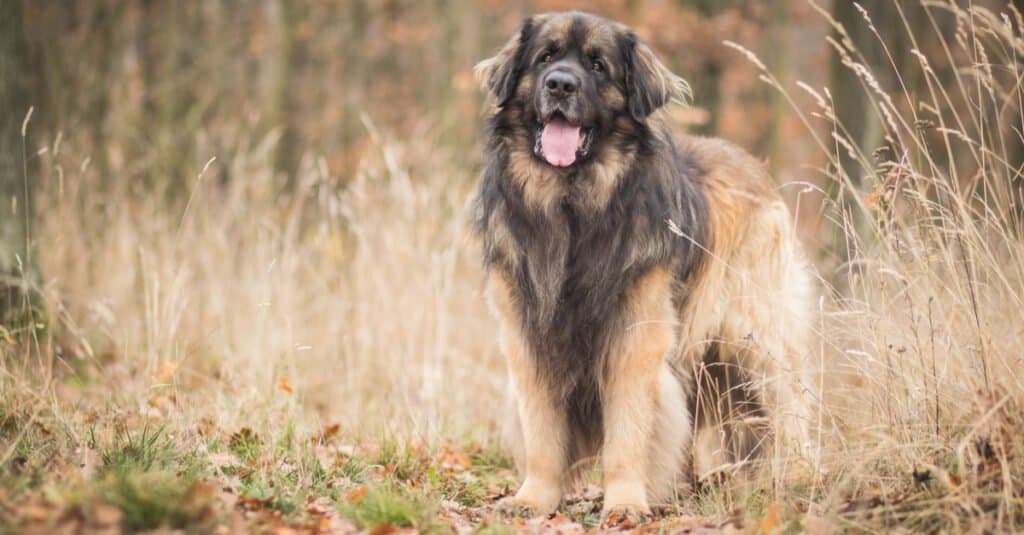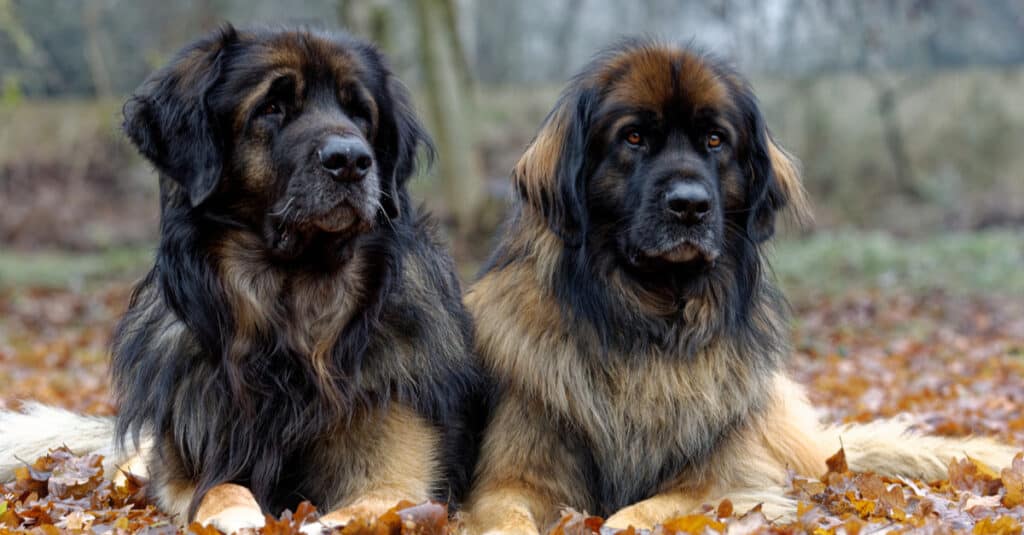Hailing from Germany, the Leonberger is an enormous dog with a gentle soul. These powerful working dogs are calm and quiet, but they are anything but lazy. They love their human companions and crave quality time with them. Regal, strong, and sensitive, it’s no wonder the Leonberger is such a beloved breed. If you’re considering welcoming one of these wonderful dogs into your family, you might wonder if a male or female dog is a better fit. Let’s delve into the key differences between male vs. female Leonbergers!
Comparing Male vs. Female Leonberger
| Male Leonberger | Female Leonberger | |
|---|---|---|
| Size | Males stand 28 to 31 inches tall and weigh 110 to 170 pounds. | Females stand 25.5 to 29.5 inches tall and weigh 90 to 140 pounds. |
| Appearance | Males are bulkier, with larger heads, broader shoulders, and more prominent manes. | Females have a more slender build and less dramatic mane. |
| Growth Rate | Males grow more slowly and reach maturity between 19 and 22 months. | Females grow quicker and reach maturity at around 18 months. |
| Reproduction | Fertile when around six to eight months old, but shouldn’t be bred until they are at least 18 months old. | Fertile at around six to eight months old, but shouldn’t be bred until they are at least two years old. |
| Health | Due to their larger size, males may be prone to and/or manifest health concerns earlier on in life. | Due to their smaller size, females may have a decreased risk of certain health concerns. |
| Temperament and Training | Males can be more stubborn and demanding, especially during adolescence (6 to 18 months) or even until they are 24 months old. | Females may be more stubborn and demanding during adolescence (6 to 18 months). |
1. Male vs. Female Leonberger: Size

Leonbergers are protective, but they’re not usually aggressive.
©AnetaZabranska/Shutterstock.com
The most obvious difference between male and female Leonbergers is their size. Male dogs stand 28 to 31.5 inches tall at the shoulders and weigh 110 to 170 pounds. Although female dogs aren’t small, they are not quite as big as males. Female Leonbergers stand 25.5 to 29.5 inches tall at the shoulders and weigh 90 to 140 pounds.
2. Male vs. Female Leonberger: Appearance

Leonbergers love being part of the family.
©Colin Seddon/Shutterstock.com
Male Leonbergers are not just taller and heavier than females. They are also bulkier, with larger heads and broader shoulders. The furry mane around their necks is also thicker and more pronounced. Females, while still imposing, have more slender bodies and less dramatic manes.
2. Male vs. Female Leonberger: Growth Rate

Although they are usually fond of children, Leonbergers should be monitored due to their large size.
©Akbudak Rimma/Shutterstock.com
Female Leonbergers grow faster than males and reach their full size earlier in life. This is partially because they are usually smaller than male dogs. For example, when they are around three months old, female Leonberger puppies typically weigh 35 to 52 pounds, while males weigh 30 to 44 pounds. However, at around 18 months old, female Leonbergers are physically mature and close to their adult size. Male Leonbergers, on the other hand, reach their full size between 19 and 22 months.
3. Male vs. Female Leonberger: Reproduction

Leonbergers enjoy athletic activities like pulling, tracking, swimming, and agility.
©Anna Krivitskaya/Shutterstock.com
Male Leonbergers reach sexual maturity around six to eight months old. At this age, they are fertile and technically can reproduce, although it is best not to breed them until they are at least 18 months old. Female Leonbergers also reach sexual maturity around six to eight months of age. However, responsible breeders will wait to breed them until they are at least two years old.
While small dog breeds can be spayed or neutered earlier on in life, larger breeds like Leonbergers grow much more slowly. Because of this, you shouldn’t spay or neuter your Leonberger until they are at least 18 months old. This allows their bones and joints to develop more fully, decreasing the risks of joint disorders, ligament tears, and some cancers. Many experts even suggest waiting until Leonbergers are at least two years old before getting them neutered or spayed because they are such large dogs and need more time for their growth plates to fully develop. This is especially true for male Leonbergers, as they take longer to grow than females do.
4. Male vs. Female Leonberger: Health

Leonbergers are active working dogs and need more than just a daily walk.
©Lolostock/Shutterstock.com
Leonbergers have an average lifespan of around seven years. Their enormous size puts a lot of stress on their organs, bones, and joints. This also means that Leonbergers are prone to various health problems like bloat, hip dysplasia, and some cancers.
Technically, neither male nor female dogs are more healthy than each other. However, because female Leonbergers tend to be smaller than males, some of the risks associated with such large bodies might be slightly less than males. Some studies suggest that male Leonbergers, due to their massive bodies, have a higher risk of developing bone cancer and polyneuropathy. However, it could also be that male dogs tend to show symptoms of health concerns earlier on because their bodies are larger.
5. Male vs. Female Leonberger: Temperament and Training

Leonbergers have lush double coats that need to be groomed regularly.
©iStock.com/AngelaBuserPhoto
Due to their massive size and active lifestyle, Leonbergers should engage in training and socialization from a young age. Fortunately, these dogs are “gentle giants” and love spending time with their humans. They are also extremely intelligent, which can make them easy to train.
However, despite their “adult” size, Leonbgers are not mentally mature until they are around two years old. They have an independent streak, and many of them can be quite stubborn. This is especially true during adolescence when they are 6 to 18 months old. Like human teenagers, they have more energy and often enjoy testing their boundaries.
Male Leonbergers mature more slowly than females. Due to their increased hormones, many males remain in this adolescent stage from 18 to 24 months old. In addition, unaltered male Leonbergers of nearly any age may be harder to handle if there is a female dog in heat nearby.
The photo featured at the top of this post is © Colin Seddon/Shutterstock.com
Ready to discover the top 10 cutest dog breeds in the entire world?
How about the fastest dogs, the largest dogs and those that are -- quite frankly -- just the kindest dogs on the planet? Each day, AZ Animals sends out lists just like this to our thousands of email subscribers. And the best part? It's FREE. Join today by entering your email below.
Thank you for reading! Have some feedback for us? Contact the AZ Animals editorial team.






